Assessment on the effects of Village Savings and Loan Associations (VSLA) on poverty reduction in Hawassa, Ethiopia
Abstract
Formal microfinance institutions have been an important tool in the fight against poverty in
developing countries, but their reach for rural people and urban slum poor are limited. Following
this, Village Savings and Loan Associations (VSLAs) are established as an alternative, informal
mechanism for saving and borrowing that do not require external capital or ongoing financial or
administrative support from a founding organization or government bodies. Thus, this study aimed
to assess the effects of women participation in VSLA on poverty reduction with a case study in
Hawassa city, Ethiopia. Using a mixed qualitative and quantitative research methodology, the study
tried to focus on examining the effects of VSLAs contribution to economic and social wellbeing of
households, and decision makings, and women participation in community activities. The study used
254 samples (127 VSLA participants, and 127 non-participants) and collected data using
questionnaire and focus group discussion.
The study used propensity score matching (PSM) to estimate the impact of women participation in
VSLA on average monthly household income, and the result indicated the average effect of women
participation in VSLA on average monthly household income of participant women is positive and
significant at 5% significant level, ranging from 169.63 Birr/month (nearest neighbor matching) to
141.55 Birr/month (Kernel matching), on average. Besides, comparison between participants and
non-participants using hypothesis testing shows that women participation in VSLA has a significant
positive association with improvements in household diet, health, children's education, and women’s
involvement in household decisions. However, although hypothesized, no significant association is
found in relation to women participation in community activities. Findings from the focus group
discussions are also consistent with the results from the PSM and hypothesis testing. Following the
findings, the study recommends government and nongovernmental organizations to provide regular,
timely and need based capacity building trainings for VSLA participants; Link VSLA participants
with formal microfinance institutions; conduct regular monitoring and follow ups by either the city
or sub-cities Women Children Affairs Department/offices or concerned government body; different
concerned stakeholders in the city including government, nongovernmental organizations,
microfinance institutions and others need to work in coordinated manner to solve the recurrent
challenges of VSLA participants in Hawassa city; and finally government and/or nongovernmental
organizations need to take best practices and lessons from existing VSLAs and expand the VSLA
initiative to address more impoverished women in the city.

